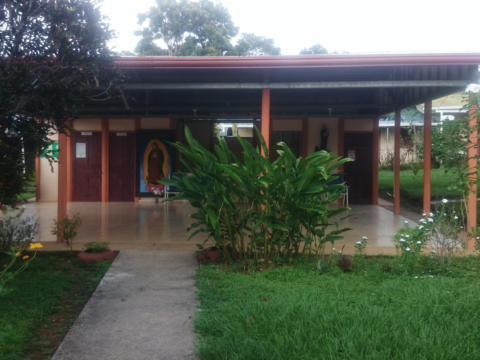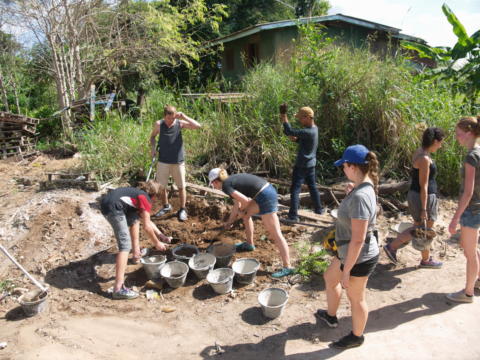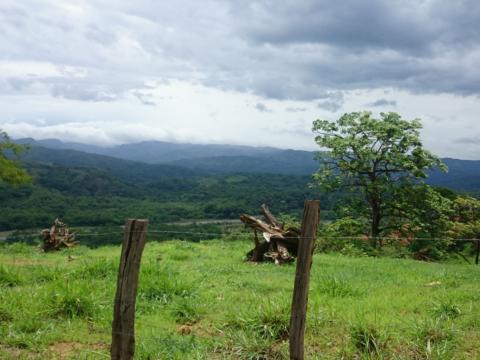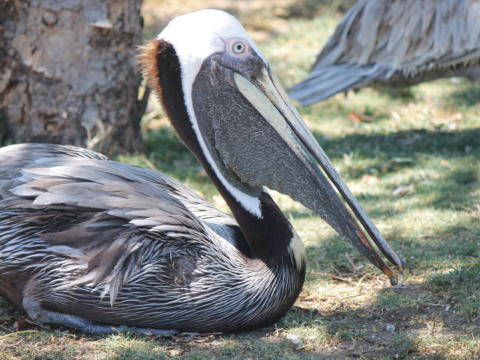Only 480€ per week!
Language Teaching
Esparza - Costa Rica
Give back to the local rural community by teaching children in government schools and by giving them exposure to other cultures and languages.
Teach in one of the many rural schools around Esparza and get an inside track on the Costa Rican educational system. Teach English (or French, German or Mandarin if qualified) to the children in a fun and practical way. Create real-life situations, games, and other activities. There is a lot of freedom for your own creativity and ideas in the classroom!
Program Description
The local government and Educational Supervisor are fully behind our project, giving us access to many schools in the area. This program consists of working with students aged between 5 and 19, teaching language classes, usually English, although we can cater for French, German or Mandarin Chinese.
Some of the larger schools have English teachers, but the teachers themselves often struggle. Participants will be free to choose their own way of teaching and may bring their own ideas into class. It is important to understand that the methods of teaching are less important than the attitude of the participant towards the students. In addition, the subjects to be taught can alter, depending on current activities in the schools which might include, for example, environmental issues or current festivals.
The teaching program serves a dual purpose; of course it is meant to help children in rural Costa Rica to have a chance to learn another language with a mother tongue speaker, but it also benefits you, giving you an insight into the Costa Rican education system as well as an excellent opportunity to become good friends with students, teachers and even parents, and so take a full role in the community.
Aims & Objectives
Costa Rica relies heavily on tourism, and tourism relies on locals speaking popular tourist languages. Private schools are often bilingual, but expensive, and children in government schools are left behind. This programme gives you the chance to improve the prospects of children in government schools by broadening their cultural horizons and giving them the confidence to use and practice a foreign language. They will learn in order to converse with you, and it will benefit them for life.
Therefore, the main aim is to continue to improve the children’s prospects by teaching them a world language. You will gain teaching experience, an invaluable life skill, and experience deep cultural immersion.
Schedule
Monday to Friday
You will be organizing and balancing a range of classes for your duration at the school. With some schools your schedule can be flexible and you may also have some say in what classes you prefer to teach, but you should be prepared to teach 3-6 hours a day. You will have lunch at the school and can expect to remain there from 08:00 until just after 16:30, depending on your schedule, giving you plenty of time to immerse yourself in the school and its activities, and to get to know its students and staff.
Note: When confirming your dates please take note of the long holidays (late Dec to early Feb) and the other Public Holidays in the Holidays section which schools may take advantage of. During such times, renovation work continues, with the option to join special classes and English camps when requested by the local community.
Note: This schedule can be changed and/or amended depending on weather conditions, local conditions and unforeseen circumstances.
Participant Criteria & Requirements
Standard Requirements
Minimum age: –
Maximum age: –
Minimum English level: Basic
CRB required: On Signup
Passport copy required: No
Resume copy required: No
Required qualification: None
Additional Requirements
There are no further requirements.
Additional Equipment
- Casual dress is appropriate during your time at the school. However, ‘beachwear’ or any other outfit that is too revealing is not allowed at all.
- Please bring rough clothes if you will be here during holidays, as you will be able to take part in school renovation work and other community work.
Location
Esparza is a medium-sized agricultural town nestled amongst the mountains above Rio Barranca, in the Central Pacific Coast area of Costa Rica. The area was first settled by the Chorotega and Huetar peoples. The Chorotega people fled from Mexico 1,500 years ago and brought their traditions with them. This is a possible reason why there are Mexican words which jump several countries and turn up again in Costa Rica.
The Spanish town was founded in 1577, making it the second oldest in the country. It has a rich history which includes legends of hidden pirate gold. Esparza is the second largest canton in the province of Puntarenas, covering an area of 216.80 km², and with a population of approximately 35,000.
The pace of life is relaxed. It is not unusual to see horses being ridden in the street. The town itself is off the tourist trail. However, the nearest beach for surf and relaxation is only 20 mins (14kms) away. Within a distance of 25 kilometers, you can also find canopy tours as well as the world-famous attractions of Puntarenas, including a marine park and a newly renovated marina. Likewise, the nearest national park, Carara, is only an hour’s drive away.
About the Accommodation
Your new home will be one of two newly built eco houses in our centre in Esparza: Jaguar House and Toucan House.
The two houses sleep up to 22 people. Most rooms have bunk beds and are shared on a single gender. One room in each house has a bunk bed with a double bed below, single above, suitable for couples or small families, if needed. (Private rooms can be obtained at additional cost; this must be arranged before arriving for your program).
All doors are lockable, but as rooms are shared, and we carry out regular cleaning, we recommend that you don't lock your rooms.
There is also a large dining hall/games room/communal area shared by both houses, with free WiFi, and table tennis, and a large garden of tropical plants, including coconut palm, papaya, banana, and citrus
Food Arrangements
Three meals a day on weekdays (two on weekends) are included during your stay. The meals will mainly be a mix of traditional and modern Costa Rican food, so you may experience the Costa Rican take on foods you will be familiar with. Most meals will include either fish, chicken, pork or beef, but vegetarians can be catered for.
Facilities
There are shops within 300 metres of the centre, and bars, restaurants, and an excellent public pool within 15 minutes walk. There is an ATM within 1km and more ATMs in town, about 2kms. Buses into town and further afield leave from within 300ms of the centre.
Esparza and the surrounding area has plenty of shops, bars and restaurants within easy reach.
Activities & Events
No scheduled activities outside the program.
Sights & Surroundings
Esparza and Puntarenas have plenty to offer for weekend activities, including horse riding, watersports (surf is huge), game fishing, canopy tours, hotels to suit all budgets, and some of the best scenery in the world. Puntarenas is also ideally suited to take a scenic ferry to the Nicoya Peninsula and its many secluded beaches.
Esparza is on the Panamerican Highway, so access to the rest of Costa Rica and the rest of the American continent is at your doorstep.
Transportation
From this location we do not provide free transport to other locations.
Quick Facts
Name: Republic of Costa Rica
Population: 4.8 million
Capital: San José
Language: Spanish
Currency: Costa Rican Colón (CRC)
Time zone: UTC -6
Country Information
Pura vida (“real life”) has become the unofficial motto of Costa Rica. And for a reason. Costa Rica is, in essence, a slice of tropical paradise in Central America, and its inhabitants, AKA “the ticos”, are justifiably proud of it. Perfect waves for surfing, breathtaking sunsets, misty crater lakes, waterfall-filled hiking trails, white-water rapids, sun-kissed beaches, adventure-filled paths and wildlife that includes howler monkeys, capuchins and other friendly-looking animals await you in this small, yet magnificently varied country.
Climate
Costa Rica has a reputation for being a tropical paradise, and rightly so. However, due to its diverse terrain, the country boasts a range of different climates.
Costa Rica has no real summer or winter due to its proximity to the equator, and the average temperature ranges from 21°C to 27°C. However, a rainy season does exist, and takes place between May and November. The central valley is often cooler than the coastal areas.
The Pacific coast tends to be hot and dry all year-round, especially the northern part (known as the Gold Coast), while the highlands (around Monteverde) are filled with mist during much of the year, due to the high altitude. The Caribbean coast is quite hot and moist, and receives rain during most of the year. The lowlands have quite a warm climate, with an average temperature of 26°C, and the Central Valley, including San José, is said to have the best climate in the country.
Culture
Costa Rican culture, as in most Latin American countries, is heavily influenced by Spain, as a result of colonization. However, parts of the country have other strong influences, such as that of Limón, which has more of a Jamaican feel to it. There are also several indigenous areas throughout the country.
A great part of the music and folklore of Costa Rica comes from the north of the country, where Mayan culture mixes with Afro-Caribbean trends. Costa Rica has a distinctive musical genre known as punto and most of its music can be easily distinguished by a very unique rhythm known as tambito.
Costa Rica goes by the motto Pura Vida, which means “pure life” and the phrase can be used as a greeting or a farewell, or just to say “that’s great” or “all’s good”. The phrase was originally from a Mexican film, but was soon adopted by Costa Ricans, and is used in several contexts to express a positive outlook on life.
Gastronomy
The cuisine of Costa Rica relies heavily on fresh fruits and vegetables as well as fish and meat. Rice and black beans are traditional and included in most meals. Potatoes are another staple of Costa Rican gastronomy as wells as plantain, a member of the banana family.
Due to the tropical location of the country, you will be able to find many exotic fruits that you might have never heard of before!
Due to the amount of tourism that Costa Rica boasts, international food is offered in many sites – from Japanese to Mexican to Peruvian.
Transportation
Plane
Two domestic airlines (NatureAir and Sansa) connect major tourist towns
Shared shuttle
Shared shuttles are available to popular destinations on a daily basis and they will pick you up from your accommodation and return you, making them the most stress-free option.
Bus
Traveling by public bus is the most affordable way to get around Costa Rica. It can be time-consuming for many Costa Ricans, as many routes are based in and out of San José. However, Esparza is 1.5 hrs away from San Jose by direct bus, and Puntarenas has access to much of the Pacific Coast by bus, so Esparza is well situated for bus transport to the whole country and beyond.





